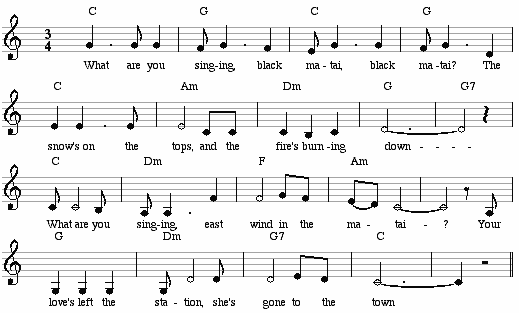

|
NEW ZEALAND FOLK * SONG |
Black
Matai The Culler's Lament lyrics Peter Cape, music Don Toms, c.1962 |
|---|
Deer were introduced into New Zealand mountains for sport. But with a mild climate and no predators, their numbers grew so great that their overgrazing caused disasterous erosion. So 'deer cullers' were paid to shoot them. Read about the cullers in Barry Crump's book A Good Keen Man.

|
 |

|
|
A station is a large isolated sheep farm.
Matai or 'black pine' is a podocarp tree common in lowland forest.
1965 William Clauson 'Packing My Things',
1982 Graham Wilson 'Billy on THe Boil'
|
Barry Crump
New Zealand
folk icon Barry Crump (1935-1996) was a very bright son of a brutal, ignorant
father. To survive, young Barry ran away into the deep forest. He started
work there as a deer culler
when he was 14. He amused his mates by spinning hard-case yarns of his
adventures.
Then came a string of potboilers which failed to sell, four failed marriages, six abandoned sons, and two disasterous outback tourist ventures. First he shipwrecked his yachting clients. Then he failed to supervise some boys at a deerstalking camp. Five of them were drowned when a 4-wheel-drive van drove into a lake. His father's legacy of violence destroyed Crumpy's early marriages. Crumpy just didn't know how to be trustingly intimate, only how to dominate. And in frustration he resorted to violence also. Rough on the outside, Crump was and sensitive within. He wrote poems and a bush ballad or two, and took photos of sunsets. Seeking a solution to his problems, he turned to God, became a Bahaii, and for a time was able to give up his heavy drinking habits. Perhaps Crump was trying to explain his efforts at fathering in his last sucessful novel, Wild Pork and Watercress. In this story, about an old bushman who helped a young misfit to grow up while on the run in the Ureweras, he finally produced a most mature and insightful story. In his final years, Crumpy settled into a stable marriage, stopped roaming, and starred in a series of increasingly far-fetched Toyota 4-wheel-drive TV adverts until his death in 1996.
|